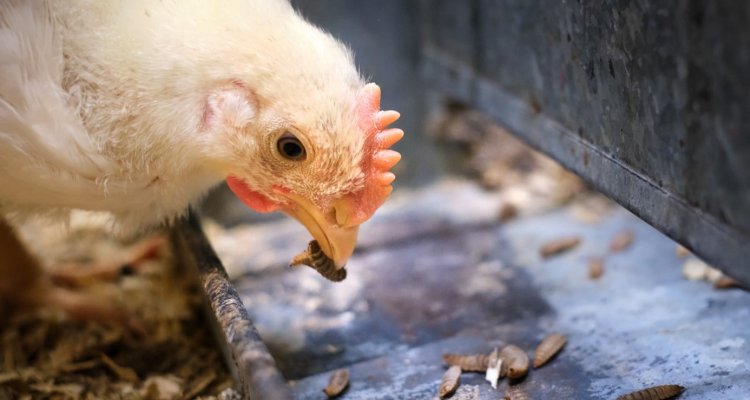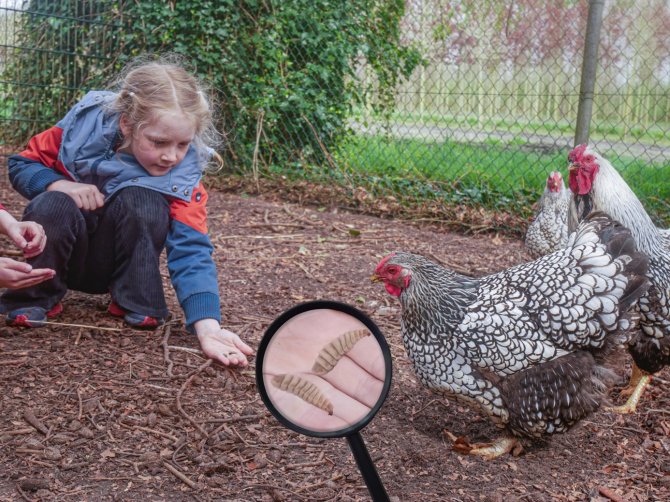
News
Insects as chicken feed: a natural and sustainable idea
Rearing insects on residue streams from the food industry can play an important role in making feed production more sustainable in the poultry sector. That is the main conclusion of the InsectFeed project which was led by Wageningen University & Research. The process proved to be safe, productive and sustainable. In addition, chicken welfare improves when insects are on the menu. However, further research into economic feasibility and the ethical aspects is needed to fulfil the potential.
Most agricultural land worldwide is used to grow animal feed. Soy is particularly important as a source of protein in animal feed, says Marcel Dicke, Professor of Entomology. “We mainly import soy from South America, but that creates a large climate footprint.” We can and need to change that, Dicke believes. He therefore advocates the use of insects as animal feed. "If we can develop insect farming in a good way, we can make agriculture less dependent on feed from abroad. Rearing insects requires a lot less space than growing crops. In the Netherlands, insect farming would work well on domestic residue streams. Moreover, insects contain a lot of high-quality protein, so you get the same output in meat with less feed."
Insects banned as feed
For a long time, using insects as animal feed was banned in Europe. After the BSE crisis at the end of the last century - the result of cows becoming infected after eating animal protein - EU legislation stipulated that farm animals could no longer be fed animal products. Dicke: "This included insects, although chickens and pigs are omnivores for whom eating insects is a natural behaviour. It was only after studies showed that consuming insects poses no food safety risks and even has important sustainability benefits that the legislation was amended. So using insects as animal feed is a relatively new agricultural activity about which much more information needs to be acquired."
Feeding insects to chickens
That knowledge was acquired among others in the InsectFeed project. This project involved a partnership consisting of WUR, the University of Groningen, HAS Den Bosch, the NVWA, the Ministry of Agriculture, Nature and Food Quality (LNV), Rabobank, ZLTO, the Dierenbescherming, GD Animal Health and insect breeders Protix and Amusca. Dicke: "The project focused on using insects as feed for chickens. Of all the types of meat production, poultry farming is the least harmful to the environment. By feeding insects to chickens, we could make this production even more sustainable. But before introducing this on a large scale, we need to know whether it can be done in a healthy, safe, animal-friendly - for both chickens and insects - and economically feasible way. We explored that in InsectFeed."

Rearing fly larvae
The project studied the larvae of the housefly and the black soldier fly as possible insect food. According to Dicke, these species are already used as animal feed worldwide. "We wanted to find out how we could rear these larvae in such a way that they have a good life. That is reflected in their development, health and natural behaviour, for example. This was something we examined in detail. We already knew that larvae like to crawl towards each other and that did happen. Being close together raises the temperature. The larvae then grow faster and are better protected from diseases. When it gets too hot, they spread out again."
Residue stream as substrate
The fly larvae were reared on residue streams from the food industry. Dicke: “That might be residue from the production of chips, fruit juice and beer, for instance. Some residue streams are already used as animal feed, but that isn’t always permitted. For example, when they contain fungi, which produce toxins. But a residue stream with fungi could potentially be used for insect farming. In the project, we studied whether this could be done safely and efficiently. And that proved to be the case. Fly larvae grew just as fast as on a 'clean' substrate, did not get sick and did not accumulate toxins. In fact, larvae even caused toxin breakdown. Such insights are important for allowing residue streams with fungi."
Economic feasibility
Another focus in the project was economic feasibility. Is it profitable for the agricultural sector to rear insects for animal feed? Not yet, the researchers conclude. But that could soon change, says Dicke. "Insect farming is still a young industry. The cost price is currently still higher than soy, but technological innovations and economies of scale can lower the cost price. You can also make the price more interesting in other ways, such as by increasing the tax on soy or by EU subsidies on using a circular protein source. In addition, insect farming produces by-products. For example, you can reuse the substrate after use for sustainable, organic fertilisation of crops."
Ethical issues
According to Dicke, economic feasibility is one of the aspects that will need further investigation. The same applies to the ethical issues. Dicke: "We know that larvae on substrates from residue streams continue to exhibit natural behaviour, but there are other ethical issues. For example, which life is worth more, that of an insect or a chicken? In the research, we found that chickens behaved more naturally when they ate live insects and responded enthusiastically to being fed with them. That is something you can factor into the moral acceptability of using insects as animal feed. Such ethical dilemmas are not something we have encountered before."
Importance of scientific insights
Dicke describes the results of the project as very promising. According to the professor, scientific insights play a crucial role in making meat production more sustainable. "This knowledge is needed for sound political decision-making. Like allowing insects as a food source, for example. I’m glad that this is receiving more consideration. Obviously, much more research is needed to develop this further. And ultimately, you are also dependent on the agricultural sector. Which is why ZLTO is an important partner in this research. But if we can demonstrate that using insects as feed is animal-friendly, sustainable and economically interesting, I see excellent prospects."
Public event InsectFeed
On 28 September, the InsectFeed partnership is organising a public event at Theater Junushoff in Wageningen. Its main purpose is to show that insects can make a valuable contribution to food production. In the theatre, visitors can learn about the many possibilities of insects as food, both for animal and human consumption. During a cooking demonstration, a chef will prepare meals with insects. There will also be a quiz, scavenger hunt and craft table, and scientists will answer all your questions about eating insects. The event is free and open to everyone.